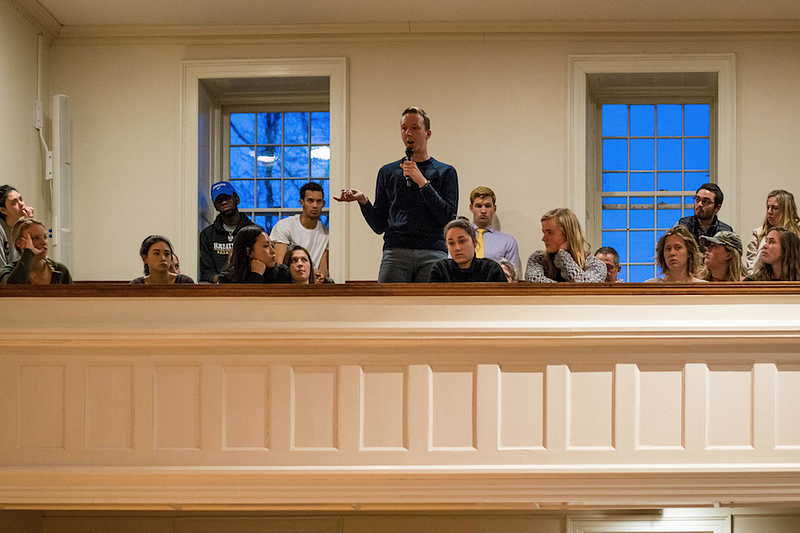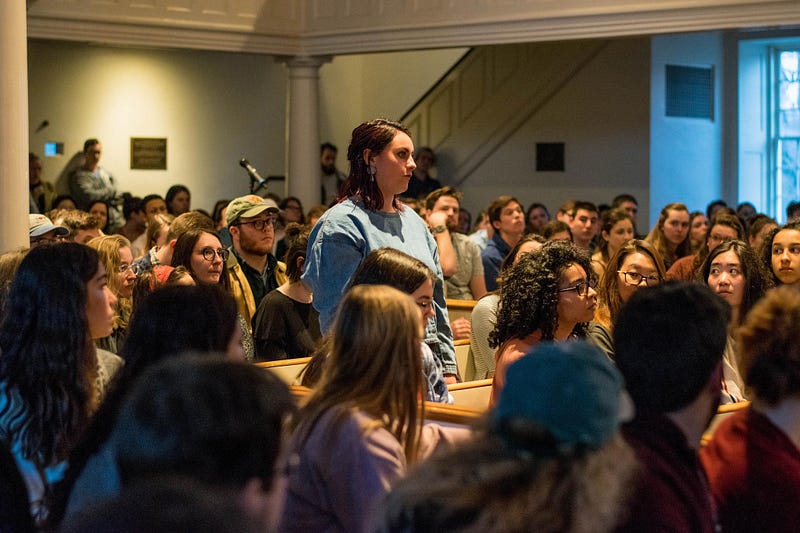
Photo Courtesy of Jade Thomas ’20
On April 2, Hamilton College held its inaugural “Town Hall” event for the purpose of discussing salient issues on campus. Billed as an event meant to bring students together along with faculty and staff to discuss free speech, mental health, sexual assault, racism and (in)tolerance, the nearly two and a half hour event featured both a session focused on airing complaints, and one meant to build consensus around solutions to these issues.
The Town Hall came the day after the release of a letter from the parents of the late Graham Burton, formerly a member of the class of 2019 who took his own life on campus in December 2016 during finals week. Initially sent to the college on March 27th, the letter outlines the events preceding Burton’s suicide, and the alleged inaction of the college in preventing Burton’s death. Specifically, the letter notes that while six members of the college staff and faculty had expressed concern regarding Burton’s mental health, including an Associate Dean, Burton’s case was not referred to the Students of Concern Committee, and his parents were not notified. The letter calls for an outside panel to review the college’s policies towards students with mental health concerns, and for faculty, students, and staff to undergo annual trainings centered around mental health.
In an already scheduled meeting on April 1, Student Assembly discussed the ramifications of the letter for over an hour, and President of the College Dean Wippman and Dean of Students Terry Martinez were on-hand to answer questions from members of Student Assembly, and other students who attended the meeting. Nadav Konforty ’20, the President of Student Assembly, reflected that while “I know to some extent, we can’t control everything and as students we can advocate for policy even if we can’t write them. We can also take care of each other and create the community for our campus.”
At the Town Hall, students first discussed the elements of Hamilton that they liked, before diving into the issues on hand. Among other facets of Hamilton, students discussed that they liked everything ranging from acapella groups, to the season of Spring.

Photo Courtesy of Jade Thomas ’20
Next, students discussed the issue of mental health on campus. Specifically, students, faculty, and staff discussed their concern about a culture of so-called “stress olympics” at Hamilton, where students compete to see who can handle the most work, and about a lack of appointments at the counseling center. Furthermore, they discussed a lack of institutional guidelines for coordinating exam schedules and the amount of nightly work, as well as the lack of an actual reading period before final exams.
Regarding free speech, students, faculty, and staff discussed the difficulty of being queer on campus, with regards to other members of the Hamilton community using proper pronouns.
Furthermore, students, faculty and staff debated to what extent there was a dominance of Western thought and culture in the classroom, and whether politically conservative and right-wing views were stigmatized. Along these lines, students, faculty, and staff discussed a survey that revealed 20 percent of the student body supported using violence to shut-down speakers they deem offensive.
On sexual assault and harassment, students, faculty, and staff discussed how sexual misconduct prevention programs, such as orientation programming and online information, should be focused on informing students of the consequences for sexual misconduct, rather than methods which place the burden of preventing rape on potential victims of violence.” Students, faculty, and staff also explored the role of secret and underground societies in sexual misconduct, and the role of party culture at Hamilton. In addition, students, faculty, and staff complained about the lack of “blue lights” on campus, and implementing trauma-informed training for administrators, HSMB members, and campus police.
On racism and intolerance, students, faculty, and staff felt there was a greater need for the discussion of current events in class.
Chidera Onyeoziri ’18 initially proposed the idea for a Town Hall to Student Assembly. She told the Hamilton news website that “the overall goal was to get students, faculty, and staff together to collectively reflect on campus culture in a way that was not reactionary but proactive, and as a consequence spur a culture of honest and meaningful dialogue.”
